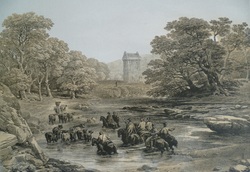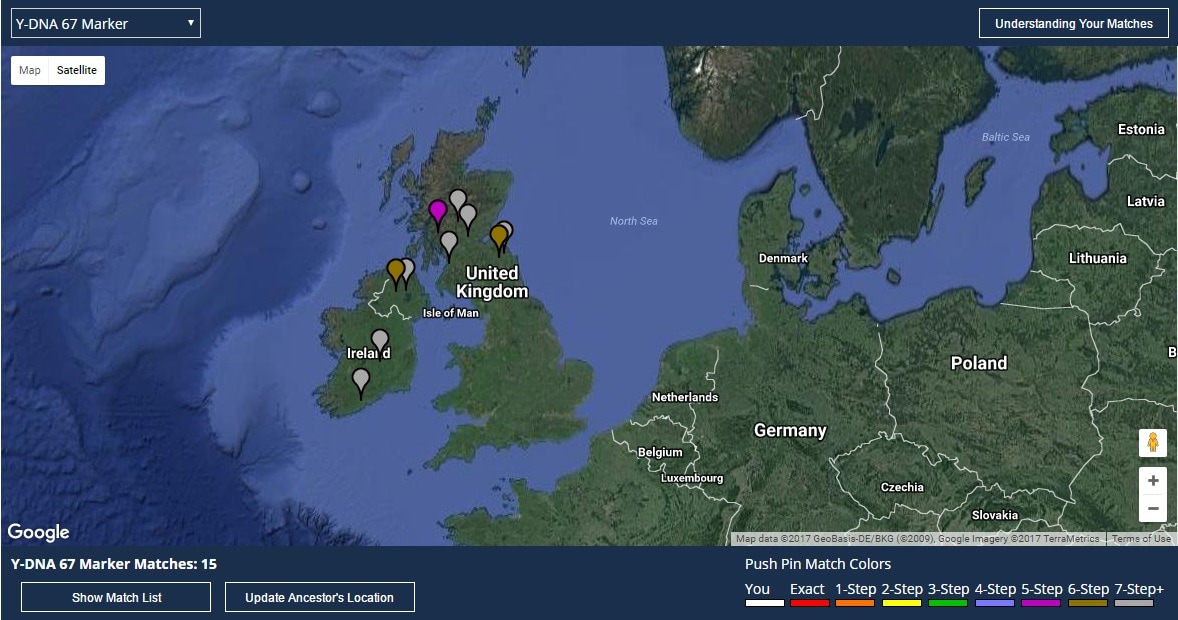|
From DNA testing, I know that I inherited both my yDNA and my Simpson surname from my 3rd great grandfather, and direct paternal antecedent, Clement Simpson. Surnames and yDNA often pass from father to son together but while a son will always inherit the yDNA from his biological father, he may sometimes not inherit the same surname. For at least 5 generations, my yDNA and surname have stuck together. But how far back does this pair go? From DNA testing, I know that I inherited both my yDNA and my Simpson surname from my 3rd great grandfather, and direct paternal antecedent, Clement Simpson. Surnames and yDNA often pass from father to son together but while a son will always inherit the yDNA from his biological father, he may sometimes not inherit the same surname. For at least 5 generations, my yDNA and surname have stuck together. But how far back does this pair go? Surnames are relatively new in most of Europe, appearing less than a thousand years ago. By 1400, most English and some Scottish people adopted surnames but many Scots did not use surnames until 1700. Many Scots previously used the system of patronymics, providing a child with a surname based on their paternity. For example, MacDonald means the son of Donald while Jónsdóttir means the daughter of Jon. At some time in the 16th century, or earlier, a Scottish family adopted the name Simson, the son of Simon, as their clan surname. Within a few generations, a "p" snuck in there and the name became Simpson. Actually, several lowland Scottish clans and northern English families adopted the Simpson name. To complicate affairs, its unlikely that all extended families adopted the same surname. One cousin took the name Simpson, after his father, but another cousin may have taken the name Dodd, which meant "rascal" in Old English. In the world of DNA and genealogy, people have creating something called Surname Projects, where men with the same last names all get their yDNA tested and then compare the results. Usually, not all the men in the project are related within the last thousand years. Instead, we see that there are several groups of related men sharing the same surname. Of the 115 men in the Simpson Surname Project, I am related to only one. This man still lives in Scotland today and I can trace his lineage back to mid-18th century Clackmannanshire, Scotland. We almost certainly share a common Simpson ancestor who lived in the lowlands of Scotland before 1650. He and I are also related to a few members of several other lowland clans. Whether this is because of non-paternity events or because cousins chose different surnames, we'll likely never know. However, it does appear as if my yDNA and the Simpson surname have been together for at least 10 generations, probably longer. I've also learned that our Simpsons are bit different than the other Simpsons in our genetic ancestry. The paternal lineage of most Simpsons stretches back thousands of years in Britain's history. The 10th, 20th, even 100th great grandfathers of most Simpsons lived somewhere in the Isles. Other Simpsons may have had Norse, Viking, or even Norman ancestry. However, our 50th great grandfather, reaching back almost 1200 years, may have been a Swedish Viking! Or, as a distant Swedish cousins suggested, the ancestor was from Norway and his progeny ended up in both Scotland and Sweden.
Swedish Vikings rarely raided west, preferring to raid east, towards Russia and the Baltics. However, our YDNA Rox2 subclade, which expanded rapidly about 1200 years ago, is comparatively even more prevalent in Sweden than it is in the northern Isles. Since it's far more likely that this subclade spread out of Scandinavia in the early Viking age rather than into that region, there is a chance that our deep ancestry came that way. Hopefully, as more men test, the answers will become more clear. I've known for a while now that the Simpsons originally migrated to the United States from the lowlands of Scotland, probably through Ireland, about 1700. History books have described my Simpson ancestors as Scotch-Irish and I have many distant DNA cousins living in Scotland and Northern Ireland.
However, my obsessive personality and fascination with DNA has driven me to continue to dig deeper. So after even more testing I have unearthed that which I already knew. Yes, the Simpsons are very likely from Scotland. Shocker. The Y-chromosome mutates every few generations. By analyzing the distribution of men with these mutations, we can tell when mutations occurred and very roughly where. Older mutations are easier to discover and analyze than new mutations so we can easily determine that half of European men descend from a common ancestor who lived on the steppes of central Asia about 40,000 years ago. However, mutations that happened a few thousand years ago are much harder to find and analyze, mostly because far fewer people have them. So I now know that the Simpson men have a mutation at the Y8402 gene. This mutation likely originated in a man born more than 1,200 years ago, somewhere in northern England, North Ireland, or Scotland. This was long before there were surnames in the region so there were no Simpsons then but its positive proof that our distant paternal ancestors lived in that region long ago. It doesn't yet narrow it down whether this paternal line was Celtic, Saxon, or some other Viking race but we're getting closer. |
Archives
2023 JAN FEB MAR APR MAY JUN JUL AUG SEP 2022 JAN FEB MAR APR MAY JUN JUL AUG SEP OCT NOV DEC 2021 JAN FEB MAR APR MAY JUN JUL AUG SEP OCT NOV DEC 2020 JAN FEB MAR APR MAY JUN JUL AUG SEP OCT NOV DEC 2019 JAN FEB MAR APR MAY JUN JUL AUG SEP OCT NOV DEC 2018 JAN FEB MAR APR MAY JUN JUL AUG SEP OCT NOV DEC 2017 JAN FEB MAR APR MAY JUN JUL AUG SEP OCT NOV DEC 2016 JAN FEB MAR APR MAY JUN JUL AUG SEP OCT NOV DEC 2015 JAN FEB MAR APR MAY JUN JUL AUG SEP OCT NOV DEC 2014 OCT NOV DEC Categories |


 RSS Feed
RSS Feed